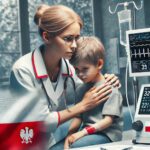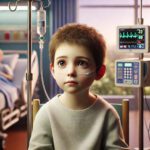Fonte: BELZER, L. T.; WRIGHT, S. M.; GOODWIN, E. J.; SINGH, M. N.; CARTER, B. S. Psychosocial Considerations for the Child with Rare Disease: A Review with Recommendations and Calls to Action. Children, [S.l.], v. 9, n. 933, 21 jun. 2022. Disponível em: https://doi.org/10.3390/children9070933. Acesso em: 27 fev 2024..
🌍 Este artigo analisa as doenças raras (DR) e seus impactos psicossociais em crianças, famílias e equipes de saúde.
- Por que isso importa: Revela a complexidade do cuidado e a necessidade de foco nas crianças com DR, além de destacar a importância de cuidados baseados em evidências e práticas ótimas.
🧠 O que está acontecendo:
- A pesquisa enfatiza a importância do ponto de vista da criança, apesar das experiências dos cuidadores serem frequentemente mais documentadas.
- Enfatiza a necessidade de cuidados multidisciplinares e coordenação entre diferentes setores de atendimento.
🔍 Nas Entrelinhas:
- Observa-se a falta de atenção às experiências pessoais das crianças com DR.
- Destaca-se a importância da inclusão de considerações psicossociais nos cuidados com essas crianças.
🏃 Resumindo:
- Os resultados mostram a necessidade de integrar práticas comprovadas e recursos ideais nos cuidados com as crianças com DR, suas famílias e equipes de saúde.
🖼️ O quadro geral:
- Propõe ações para melhorar a qualidade de vida e promover cuidados baseados em evidências para crianças com DR, suas famílias e equipes de saúde.
💭 Nossa opinião:
- O artigo reforça a importância de uma abordagem centrada na criança, considerando todos os aspectos de seu bem-estar em meio aos desafios das DR.
Destaques
- Crianças com Doenças Raras (DR) frequentemente têm condições médicas crônicas e complexas, necessitando de um ambiente de cuidados complicado por diversos profissionais de saúde.
- Esta revisão examina as DRs e suas ramificações psicossociais para crianças, famílias e a equipe de saúde.
- O conhecimento existente sobre crianças com DR descreve as experiências psicossociais de suas famílias e cuidadores [16,17], mas a criança com DR deve permanecer o ponto focal.
- Esta revisão se empenhou em fornecer um exame minucioso das considerações psicossociais para a criança com DR.
- Os resultados examinam as DR e suas ramificações psicossociais para crianças, famílias e o sistema de saúde.
- Ao resumir a literatura através de uma amostragem proposital da literatura científica, são dadas recomendações para integrar o que se conhece das melhores práticas atuais, acessando recursos ótimos, e propostas formuladas como ‘chamados à ação’ para elevar a qualidade de vida e promover o cuidado baseado em evidências para crianças com DR, suas famílias e equipes de saúde.
O artigo em perguntas e respostas
- Quais são algumas das principais considerações psicossociais que as crianças com doenças raras podem enfrentar?
As crianças com doenças raras podem enfrentar várias considerações psicossociais importantes, incluindo:
Odisseia diagnóstica: O processo de identificação das bases genéticas de uma doença rara pode ser emocionalmente desafiador para as famílias, levando à incerteza e ao estresse.
Isolamento e Solidão: Crianças com doenças raras podem sentir-se isoladas por serem um dos poucos indivíduos com diagnóstico específico, levando a sentimentos de solidão.
Necessidades médicas complexas: As crianças com doenças raras têm frequentemente condições médicas complexas que requerem cuidados extensivos, o que pode afetar o seu funcionamento diário e a sua qualidade de vida .
Estigma e falta de compreensão: As crianças com doenças raras podem enfrentar estigma em vários contextos, como na educação, no emprego e na comunidade, devido à falta de consciência e compreensão sobre a sua condição .
Dinâmica familiar: A presença de uma criança com uma doença rara pode impactar significativamente a dinâmica familiar, levando a mudanças nos papéis, nas responsabilidades e no bem-estar emocional dos membros da família.
Incerteza sobre o prognóstico e o tratamento: Devido à raridade da sua doença, as crianças com doenças raras e as suas famílias podem enfrentar incertezas sobre o curso da doença, os tratamentos disponíveis e os resultados a longo prazo.
2. Como podem os prestadores de cuidados de saúde e os cuidadores apoiar melhor as crianças com doenças raras numa perspetiva psicossocial?
Os prestadores de cuidados de saúde e os cuidadores podem apoiar crianças com doenças raras numa perspetiva psicossocial das seguintes formas:
- Abordagem de Cuidados Holísticos: Adotar uma abordagem holística de cuidados que considere não apenas as necessidades médicas da criança, mas também o seu bem-estar psicossocial, saúde emocional e qualidade de vida.
- Comunicação e Educação: Proporcionar uma comunicação clara e aberta com a criança e a sua família sobre a doença rara, opções de tratamento, prognóstico e serviços de apoio disponíveis para capacitá-los com conhecimento e compreensão.
- Serviços de apoio psicossocial: Oferecem acesso a serviços de apoio psicossocial, como aconselhamento, profissionais de saúde mental, grupos de apoio e assistentes sociais para ajudar as crianças e as famílias a lidar com os desafios emocionais de viver com uma doença rara.
- Coordenação dos Cuidados: Garantir cuidados coordenados entre equipas de saúde multidisciplinares para responder às complexas necessidades médicas e psicossociais das crianças com doenças raras, promovendo a continuidade dos cuidados e do apoio.
- Empatia e Compreensão: Demonstrar empatia, compreensão e sensibilidade relativamente às experiências e desafios únicos enfrentados pelas crianças com doenças raras e pelas suas famílias, promovendo um ambiente de cuidados de apoio e compassivo.
- Advocacy e Empoderamento: Defender as necessidades e os direitos das crianças com doenças raras e capacitar as famílias para participarem ativamente nos processos de tomada de decisão relativos aos seus cuidados, tratamento e serviços de apoio.
- Ao implementar estas estratégias, os prestadores de cuidados de saúde e os cuidadores podem melhorar o bem-estar psicossocial das crianças com doenças raras, promover a resiliência e melhorar a qualidade de vida geral da criança e da sua família.
3. Quais são algumas das recomendações e apelos à ação propostos no artigo para melhorar o bem-estar das crianças com doenças raras?
O artigo fornece diversas recomendações e apelos à ação para melhorar o bem-estar das crianças com doenças raras:
- Percursos de apoio melhorados: Propor a necessidade de sistemas melhorados de cuidados e de prestação de cuidados para promover o apoio em vários contextos às crianças com doenças raras e às suas famílias.
- Integração de cuidados psicossociais: defender a integração dos cuidados psicossociais como parte padrão dos cuidados de rotina para crianças com doenças raras e suas famílias, para colmatar as lacunas no apoio psicossocial à saúde.
- Colaboração Interdisciplinar: Enfatizar a importância da colaboração interdisciplinar e do trabalho em rede entre prestadores de cuidados de saúde, organizações de pacientes e agências de financiamento para simplificar o acesso a cuidados psicossociais e serviços de apoio para famílias de crianças com doenças raras.
- Cuidados Centrados na Família: Promover abordagens de cuidados centrados na família que considerem as necessidades psicossociais de toda a unidade familiar, reconhecendo os encargos enfrentados pelas famílias no equilíbrio das responsabilidades de cuidados com outros aspectos da vida.
- Defesa de mudanças políticas: Apelar a mudanças políticas e investimentos em políticas robustas de licença familiar remunerada, programas de cuidados infantis adaptados a crianças com doenças raras e cuidados familiares remunerados para aliviar o impacto das necessidades crónicas de saúde nas famílias.
- Melhorar a acessibilidade: Recomendar a melhoria da acessibilidade nas comunidades, melhorando o transporte acessível a cadeiras de rodas e tornando os espaços e atividades comunitários mais inclusivos para crianças com doenças raras, independentemente do estado de deficiência.
Estas recomendações e apelos à ação visam dar resposta às necessidades multifacetadas das crianças com doenças raras e das suas famílias, defendendo um apoio abrangente, uma melhor prestação de cuidados e mudanças políticas para melhorar o seu bem-estar e qualidade de vida.
Fonte: BELZER, L. T.; WRIGHT, S. M.; GOODWIN, E. J.; SINGH, M. N.; CARTER, B. S. Psychosocial Considerations for the Child with Rare Disease: A Review with Recommendations and Calls to Action. Children, [S.l.], v. 9, n. 933, 21 jun. 2022. Disponível em: https://doi.org/10.3390/children9070933. Acesso em: 27 fev 2024..






